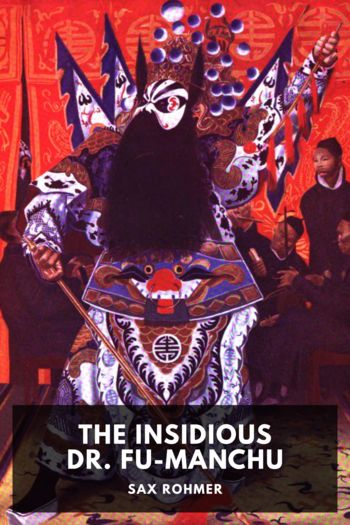The Insidious Dr. Fu Manchu - Sax Rohmer (best ebook reader TXT) 📗

- Author: Sax Rohmer
- Performer: -
Book online «The Insidious Dr. Fu Manchu - Sax Rohmer (best ebook reader TXT) 📗». Author Sax Rohmer
me back. His eyes were glaring horribly. I had just
reached his side when he fell, writhing, upon the floor.
He seemed past speech, but as I raised him and laid him upon
the couch, he gasped something that sounded like `The red hand!’
Before I could get to bell or telephone he was dead!”
Mr. Burboyne’s voice shook as he spoke the words, and Smith seemed
to find this evidence confusing.
“You do not think he referred to the mark on his own hand?”
“I think not. From the direction of his last glance, I feel
sure he referred to something in the study.”
“What did you do? Having summoned the servants, I ran into the study.
But there was absolutely nothing unusual to be seen. The windows were closed
and fastened. He worked with closed windows in the hottest weather.
There is no other door, for the study occupies the end of a narrow wing,
so that no one could possibly have gained access to it, whilst I was
in the library, unseen by me. Had someone concealed himself in the study
earlier in the evening—and I am convinced that it offers no hiding-place—
he could only have come out again by passing through here.”
Nayland Smith tugged at the lobe of his left ear, as was his
habit when meditating.
“You had been at work here in this way for some time?”
“Yes. Sir Crichton was preparing an important book.”
“Had anything unusual occurred prior to this evening?”
“Yes,” said Mr. Burboyne, with evident perplexity; “though I attached
no importance to it at the time. Three nights ago Sir Crichton
came out to me, and appeared very nervous; but at times his nerves—
you know? Well, on this occasion he asked me to search the study.
He had an idea that something was concealed there.”
“Some THING or someone?”
“`Something’ was the word he used. I searched, but fruitlessly,
and he seemed quite satisfied, and returned to his work.”
“Thank you, Mr. Burboyne. My friend and I would like a few minutes’
private investigation in the study.”
SIR CRICHTON DAVEY’S study was a small one, and a glance sufficed to
show that, as the secretary had said, it offered no hiding-place. It was
heavily carpeted, and over-full of Burmese and Chinese ornaments and curios,
and upon the mantelpiece stood several framed photographs which showed
this to be the sanctum of a wealthy bachelor who was no misogynist.
A map of the Indian Empire occupied the larger part of one wall.
The grate was empty, for the weather was extremely warm, and a
green-shaded lamp on the littered writing-table afforded the only light.
The air was stale, for both windows were closed and fastened.
Smith immediately pounced upon a large, square envelope that lay beside
the blotting-pad. Sir Crichton had not even troubled to open it,
but my friend did so. It contained a blank sheet of paper!
“Smell!” he directed, handing the letter to me. I raised it to my nostrils.
It was scented with some pungent perfume.
“What is it?” I asked.
“It is a rather rare essential oil,” was the reply,
“which I have met with before, though never in Europe.
I begin to understand, Petrie.”
He tilted the lamp-shade and made a close examination of the scraps
of paper, matches, and other debris that lay in the grate and on the hearth.
I took up a copper vase from the mantelpiece, and was examining it curiously,
when he turned, a strange expression upon his face.
“Put that back, old man,” he said quietly.
Much surprised, I did as he directed.
“Don’t touch anything in the room. It may he dangerous.”
Something in the tone of his voice chilled me, and I hastily
replaced the vase, and stood by the door of the study,
watching him search, methodically, every inch of the room—
behind the books, in all the ornaments, in table drawers,
in cupboards, on shelves.
“That will do,” he said at last. “There is nothing here and I
have no time to search farther.”
We returned to the library.
“Inspector Weymouth,” said my friend, “I have a particular
reason for asking that Sir Crichton’s body be removed from
this room at once and the library locked. Let no one be
admitted on any pretense whatever until you hear from me.”
It spoke volumes for the mysterious credentials borne by my
friend that the man from Scotland Yard accepted his orders
without demur, and, after a brief chat with Mr. Burboyne,
Smith passed briskly downstairs. In the hall a man who looked
like a groom out of livery was waiting.
“Are you Wills?” asked Smith.
“Yes, sir.”
“It was you who heard a cry of some kind at the rear of the house
about the time of Sir Crichton’s death?”
“Yes, sir. I was locking the garage door, and, happening to look up
at the window of Sir Crichton’s study, I saw him jump out of his chair.
Where he used to sit at his writing, sir, you could see his shadow
on the blind. Next minute I heard a call out in the lane.”
“What kind of call?”
The man, whom the uncanny happening clearly had frightened,
seemed puzzled for a suitable description.
“A sort of wail, sir,” he said at last. “I never heard anything
like it before, and don’t want to again.”
“Like this?” inquired Smith, and he uttered a low, wailing cry,
impossible to describe. Wills perceptibly shuddered; and, indeed,
it was an eerie sound.
“The same, sir, I think,” he said, “but much louder.”
“That will do,” said Smith, and I thought I detected a note of triumph
in his voice. “But stay! Take us through to the back of the house.”
The man bowed and led the way, so that shortly we found ourselves
in a small, paved courtyard. It was a perfect summer’s night,
and the deep blue vault above was jeweled with myriads of starry points.
How impossible it seemed to reconcile that vast, eternal calm
with the hideous passions and fiendish agencies which that night
had loosed a soul upon the infinite.
“Up yonder are the study windows, sir. Over that wall on your left
is the back lane from which the cry came, and beyond is Regent’s Park.”
“Are the study windows visible from there?”
“Oh, yes, sir.”
“Who occupies the adjoining house?”
“Major-General Platt-Houston, sir; but the family is out of town.”
“Those iron stairs are a means of communication between the domestic
offices and the servants’ quarters, I take it?”
“Yes, sir.”
“Then send someone to make my business known the Major-General’s
housekeeper; I want to examine those stairs.”
Singular though my friend’s proceedings appeared to me, I had ceased
to wonder at anything. Since Nayland Smith’s arrival at my rooms I
seemed to have been moving through the fitful phases of a nightmare.
My friend’s account of how he came by the wound in his arm;
the scene on our arrival at the house of Sir Crichton Davey;
the secretary’s story of the dying man’s cry, “The red hand!”;
the hidden perils of the study; the wail in the lane—
all were fitter incidents of delirium than of sane reality.
So, when a white-faced butler made us known to a nervous old lady
who proved to be the housekeeper of the next-door residence,
I was not surprised at Smith’s saying:
“Lounge up and down outside, Petrie. Everyone has cleared off now.
It is getting late. Keep your eyes open and be on your guard.
I thought I had the start, but he is here before me, and, what is worse,
he probably knows by now that I am here, too.”
With which he entered the house and left me out in the square,
with leisure to think, to try to understand.
The crowd which usually haunts the scene of a sensational crime
had been cleared away, and it had been circulated that Sir Crichton
had died from natural causes. The intense heat having driven most
of the residents out of town, practically I had the square to myself,
and I gave myself up to a brief consideration of the mystery in which I
so suddenly had found myself involved.
By what agency had Sir Crichton met his death?
Did Nayland Smith know? I rather suspected that he did.
What was the hidden significance of the perfumed envelope?
Who was that mysterious personage whom Smith so evidently dreaded,
who had attempted his life, who, presumably, had murdered
Sir Crichton? Sir Crichton Davey, during the time that he had held
office in India, and during his long term of service at home,
had earned the good will of all, British and native alike.
Who was his secret enemy?
Something touched me lightly on the shoulder.
I turned, with my heart fluttering like a child’s. This night’s
work had imposed a severe strain even upon my callous nerves.
A girl wrapped in a hooded opera-cloak stood at my elbow,
and, as she glanced up at me, I thought that I never had seen
a face so seductively lovely nor of so unusual a type.
With the skin of a perfect blonde, she had eyes and lashes
as black as a Creole’s, which, together with her full red lips,
told me that this beautiful stranger, whose touch had so startled me,
was not a child of our northern shores.
“Forgive me,” she said, speaking with an odd, pretty accent,
and laying a slim hand, with jeweled fingers, confidingly upon
my arm, “if I startled you. But—is it true that Sir Crichton
Davey has been—murdered?”
I looked into her big, questioning eyes, a harsh suspicion laboring
in my mind, but could read nothing in their mysterious depths—
only I wondered anew at my questioner’s beauty. The grotesque
idea momentarily possessed me that, were the bloom of her red
lips due to art and not to nature, their kiss would leave—
though not indelibly—just such a mark as I had seen upon the dead
man’s hand. But I dismissed the fantastic notion as bred
of the night’s horrors, and worthy only of a mediaeval legend.
No doubt she was some friend or acquaintance of Sir Crichton
who lived close by.
“I cannot say that he has been murdered,” I replied, acting upon the latter
supposition, and seeking to tell her what she asked as gently as possible.
“But he is—Dead?”
I nodded.
She closed her eyes and uttered a low, moaning sound, swaying dizzily.
Thinking she was about to swoon, I threw my arm round her shoulder
to support her, but she smiled sadly, and pushed me gently away.
“I am quite well, thank you,” she said.
“You are certain? Let me walk with you until you feel quite
sure of yourself.”
She shook her head, flashed a rapid glance at me with her beautiful eyes,
and looked away in a sort of sorrowful embarrassment, for which I was entirely
at a loss to account. Suddenly she resumed:
“I cannot let my name be mentioned in this dreadful matter, but—I think
I have some information—for the police. Will you give this to—
whomever you think proper?”
She handed me a sealed envelope, again met my eyes
with one of her dazzling glances, and hurried away.
She had gone no more than ten or twelve yards, and I still was
standing bewildered, watching her graceful, retreating figure,
when she turned abruptly and came back.
Without looking directly at





Comments (0)